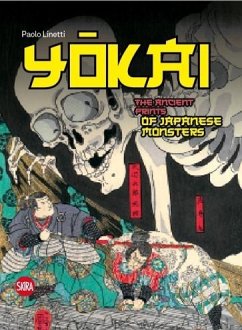The long Pax Tokugawa was founded on the blood of 40,000 severed enemy heads. Indeed, 1600 marked the end of the period of wars that saw the defeat of the troops opposed to General Ieyasu Tokugawa. The absence of wars, banishing the memories and horrors of past massacres, favoured the development of epic tales that gave rise to dark and terrifying atmospheres, such as the game of the hundred candles, a test of courage in which a handful of warriors meet on a summer night to tell each other scary stories populated by monsters from the national tradition. So we have the Joro¯ gumo, comely women who reveal their true nature as enormous spiders to their victims; the Tanuki, endearing badgers able to transform themselves; the Bakeneko, monstrous cats; the Kappa, aquatic beings that pester women; the Ningyo, mermaids whose fragrant flesh can give men renewed youth or an excruciating death. The macabre ritual of the hundred candles is the great idea behind this original project that presents 200 works from the 18th and 19th centuries, including prints, rare antique books, clothes, weapons, swords, a samurai suit of armour, as well as seventy-seven precious netsuke, small ivory sculptures, from the Bertocchi private collection and a ten-metre long scroll that tells the story of Shutendoji, a mythological creature (Oni) at the head of an army of monsters that haunted Mount Oe near Kyoto. Published on the occasion of the exhibition at the Villa Reale in Monza, the book is a real journey of discovery of Japanese imagery, ranging from Hokusai's famous manga notebooks (alongside his other masterpieces) to the works of Loputyn, the contemporary illustrator well known to hotaku manga enthusiasts.
Hinweis: Dieser Artikel kann nur an eine deutsche Lieferadresse ausgeliefert werden.
Hinweis: Dieser Artikel kann nur an eine deutsche Lieferadresse ausgeliefert werden.


